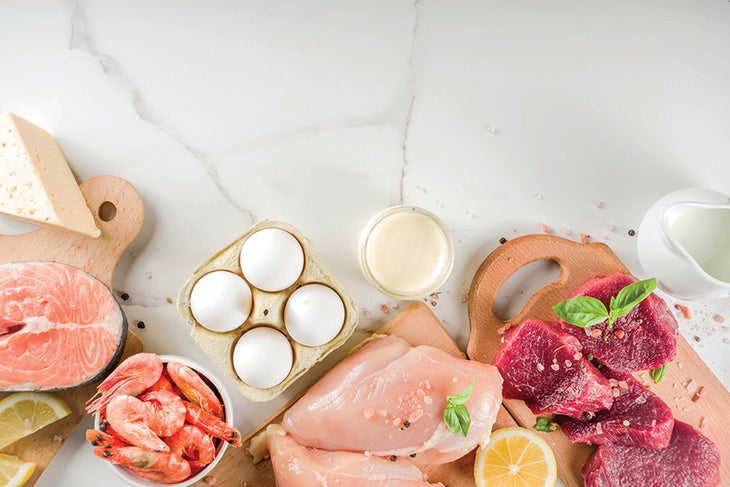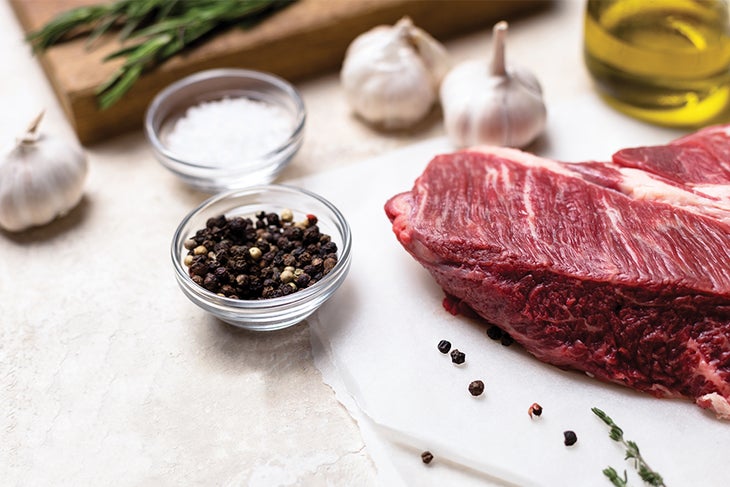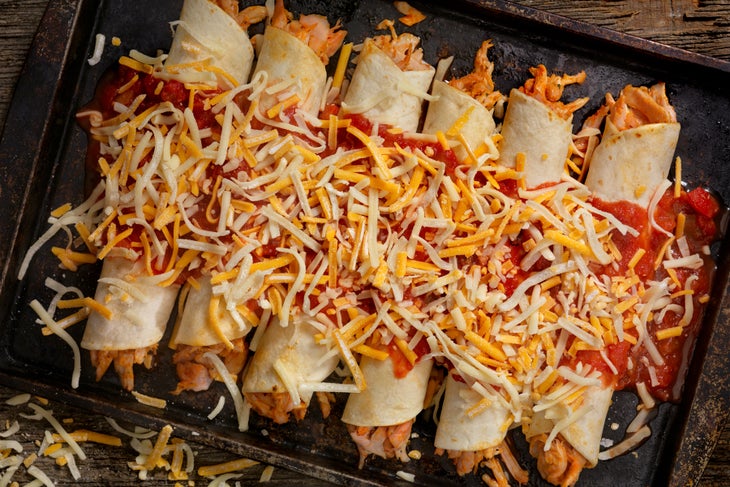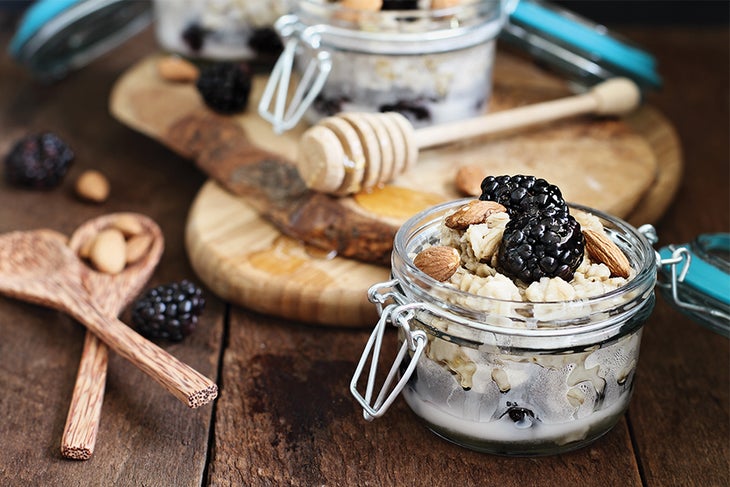A Good High Protein Diet Plan
Get access to everything we publish when you sign up for Outside+.
Ask 10 people in the gym how they prefer to eat — for gains, to get lean or for performance — and you'll get 10 different answers. And every month, there is a new diet or nutrition fad that everyone jumps to follow — keto, Paleo, Whole30 and the like. But one style seems to get the brunt of the negative press, and myths about its veracity perpetuate, no matter how much research is done to disprove them — eating high-protein.
Depending on who you ask (or follow on social media), anything above and beyond the Recommended Daily Allowance for protein will cause liver and kidney damage, overtax your digestive system, and even cause you to instantly gain body fat by eating more than your fair share of chicken in one sitting. So what is hype and what is truth? How much protein can — or should — you eat in order to stay healthy and still hit your goals? Read on to find out.

Myth Busting
The most prevalent myth about eating high-protein is that it is hard on your kidneys, or worse, that it actually causes liver and kidney damage. Second only to the organ-murdering effects of a high-protein diet is the idea that any excess protein you eat quickly turns into body fat. Even though research has proved time and again that these concepts are false, for some reason, they persist. Here's the real scoop.
Protein is one of only three macronutrients that constitutes your diet — the other two being carbs and fat — and is composed of amino acids, the fundamental building blocks of muscle that are also essential components for basic cellular function. Since your body can't store protein as it does carbs and fat, it's important to continuously replenish your supply of amino acids by eating plenty of protein every day. But is there a limit as to what your body can handle? Nope.
Research has shown that there's no absolute upper limit to protein intake and no indication that you will incur irreparable damage to your organs or physique if you eat more than the RDA of 0.8 g/kg of bodyweight. Case in point: A study published in the Journal of the International Society of Sports Nutrition found that those eating a very high-protein diet (4.4 g/kg/day) showed no ill effects on body composition, organ function or overall health. Take that in a moment: Consuming more than five times the RDA for protein had no negative effects and did not cause any gains in body fat.

Obviously, you should not go out and eat a side of beef in one sitting, but it bears remembering that the RDA for protein is just a baseline and represents the bare minimum needed to prevent illness and/or malnutrition. For athletes, there are other considerations that come into play, depending on your strength and building-muscle and endurance goals, and this demographic, most experts agree, should take in between 1.6 and 2.2 g/kg of protein per day broken up between three to four meals, or about 20 to 30 grams of protein per meal.
Animal vs. Plant-Based Proteins
The two biggest factors that determine protein quality are digestibility and amino-acid profile, and any source — animal or plant-based — that contains all the amino acids your body needs are considered complete proteins. All animal proteins are complete, whereas many plant-based options are incomplete, meaning they lack one or more essential amino acids.
However, following a plant-based lifestyle does not inhibit you from eating a complete amino-acid profile — you'll just have to work a little harder for it. As long as you're getting a variety of plant-based protein sources throughout the day, you should fulfill all your amino-acid needs and hit your daily protein totals.
Try the High-Pro Approach
These two-week, high-protein meal plans were designed with athletic women in mind and can maximize your strength and muscle-building potential while supporting your lean-body goals. Choose your path — animal-based or lacto-ovo — and follow the prescribed meal plan. If you prefer to stay completely away from animal-based proteins, simply replace those with plant-based options like soy, tofu, tempeh and plant-based protein powders of equal protein value.
Standard Meal Plan


Vegetarian Meal Plan


Recipes

Chicken Enchiladas
Makes: 4 Servings
INGREDIENTS
2 tbsp olive oil
½ yellow onion, diced
1 small bell pepper, diced
1 tsp minced garlic
dash salt
dash pepper
12 oz cooked chicken breast, diced
½ (10-oz) can diced tomatoes and green chilies
4 low-calorie whole-wheat tortillas
½ (10-oz) can enchilada sauce, divided
1 cup low-fat Mexican shredded cheese
DIRECTIONS
Preheat oven to 350 F. Heat oil in large saute pan over medium-high. Add onions, peppers, garlic, salt and pepper. Saute until onions are translucent and soft. Add chicken, tomatoes and green chilies and saute until warm, about 3 to 5 minutes. To assemble enchiladas, lay tortillas on a flat surface. Spread each with 1½ tablespoons of enchilada sauce and chicken mixture (in a line down the center). Roll them up and place in a baking dish. Pour remaining enchilada sauce over top and sprinkle with cheese. Bake until cheese is melted and enchiladas are slightly crisp, about 15 minutes. Serve warm with your favorite garnishes, such as tomatoes, fat-free sour cream, guacamole, salsa, cilantro, hot sauce, etc.
Nutrition Facts (per serving – regular): calories 402, fat 19 g, protein 44 g, sodium 972 mg, carbs 27 g, fiber 15 g, sugar 5 g
- To make this recipe vegetarian, sub chicken for 1 pound of extra-firm tofu.
Nutrition Facts (per serving – vegetarian): calories 354, fat 21 g, protein 27 g, sodium 907 mg, carbs 29 g, fiber 14 g, sugar 5 g
Sheet-Pan Roasted Turkey Breast
Makes: 4 Servings
INGREDIENTS
1 (1-2 lb) boneless turkey breast, skin on
2 tbsp olive oil, divided
½ tsp salt, divided
1 tsp black pepper, divided
2 tsp dried rosemary, divided
2 tsp fresh thyme, divided
1 lb Brussels sprouts, halved
2 medium onions, cubed
2 cloves garlic, sliced
2 large sweet potatoes, cubed
INSTRUCTIONS
Preheat oven to 375 F and line a baking sheet with aluminum foil. Trim excess fat from turkey but leave skin on. Pat dry with paper towels and then brush with 1 tablespoon olive oil. Season with half each of salt, pepper, rosemary and thyme. Place on baking sheet skin-side up. Place Brussels sprouts, onions, garlic and sweet potatoes in a large bowl and toss to combine. Spoon onto baking sheet around turkey. Drizzle with remaining olive oil and season with remaining salt, pepper, rosemary and thyme. Roast on the top rack 15 minutes, then stir the veggies. Roast another 10 to 15 minutes, or until the internal temperature of the turkey reaches 165 F at the thickest part and the Brussels sprouts are slightly browned.
Nutrition Facts (per serving): calories 330, fat 9 g, protein 31 g, sodium 444 mg, carbs 35 g, fiber 8 g, sugar 11 g

Vanilla Blackberry Overnight Oats
Makes: 1 Serving
INGREDIENTS
1/3 cup dry rolled oats
1/3 cup unsweetened high-protein dairyfree
milk of choice
1 scoop plant-based vanilla protein powder
1 tbsp chia seeds
1 tsp maple syrup
¼ tsp vanilla extract
dash salt
¼ cup fresh blackberries
DIRECTIONS
Place all ingredients except blackberries in a small Mason jar and stir well to combine. Cover and refrigerate overnight. Before serving, mix in blackberries.
Nutrition Facts: calories 402, fat 10 g, protein 34 g, sodium 378 mg, carbs 45 g, fiber 13 g, sugar 17 g
Cilantro Lime Mango Quinoa Bowl
Makes: 2 Servings
INGREDIENTS
1 cup cooked red or tri-colored quinoa
1 cup chickpeas, rinsed and drained
8 oz firm tofu, diced
1 avocado, diced
½ cup mango, diced
½ small white onion, diced
½ cup black beans, rinsed and drained
¼ tsp black pepper
¼ tsp sea salt
2 tbsp chopped fresh cilantro
2 tbsp olive oil
2 tbsp lime juice
DIRECTIONS
Add all ingredients to a medium bowl and toss well.
Nutrition Facts (per serving): calories 626, fat 34 g, protein 24 g, sodium 713 mg, carbs 64 g, fiber 17 g, sugar 11 g
CALCULATE YOUR NEEDS
How much protein do you need? Use this calculation to find out.
(Your bodyweight) ÷ 2.2 = weight in kilograms
(weight in kilograms x 1.6) to (weight in kilograms x 2.2)
=grams of protein needed per day
So a woman who weighs 135 pounds (61.36 kilograms) would need between 98 and 134 grams of protein per day, or 24 to 33 grams of protein per each of four meals.
Source: https://www.oxygenmag.com/nutrition-for-women/2-week-high-protein-meal-plan/